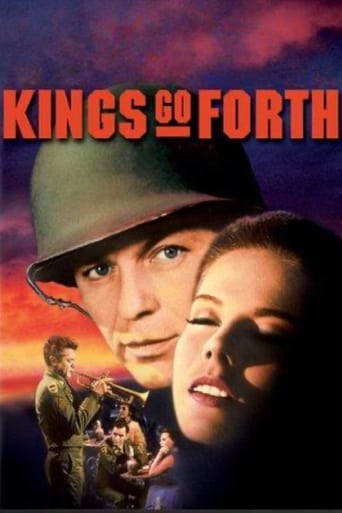

Kings Go Forth (1958)I shouldn't have loved this movie as much as I did. But it touches on those basics of love and life and rivalry and goodness I couldn't help be manipulated. And it's set in Villefranche, one of my favorite places in the world, and it's set during WWII, when life for Europe was its most on fire. And there I was, crying and loving it."Kings Go Forth" is actually a slightly late in the game WWII flick that shifts attention at first to luxuriating soldiers in the south of France just as the war was ending. It's not as much about war (though there are some remnants of fightings which are tense). It's more about a bunch of decent guys, two of them in particular, and their misunderstandings. And it's about love. The south of France and the Mediterranean is about as decent a setting for romance as you get. It's idealizing (everyone loves the Americans in their Jeeps, which must be half true, but not entirely), and it's all sunny weather and champagne. Except that love is never easy, and it gets more and more intense, sad, and profound. Yes, profound.Tony Curtis is terrific as usual. As Brit Harris he is charming, funny, and clever. Natalie Wood in one of many great roles between "Rebel Without a Cause" and "West Side Story" is rather perfect, except maybe her French accent. But she represents, as Monique Blair, something perfectly innocent and yet ravaged by war. The other lead, the main character Sam Loggins, is played by Frank Sinatra, and Loggins also loves Blair. At first Loggins is noble and lets Harris win the girl's heart, but then it gets complicated.There is a fabulous last war scene for the climax, featuring a special mission needing just two men--our leads, now enemies and distrustful. But in the heat of their battle, Harris gives some real wisdom about character, and Loggins shows true compassion. It's war, the worst and the best of it. And it's the worst and best of love, too, with an ending just slightly hanging in mid-air.Director Delmer Daves pulls off a lot of great, nicely felt films. They often lack an edge of innovation or of real probing triumph, but this is one of those that brings a lot of issues, including racism at its simplest, to a believable story. Don't brush this movie off. And don't be put off by the first twenty minutes or so when the establishing scenes seem like just another good war film. This one goes places, at least for the romantic.
... View MoreThis film certainly deserves more attention. One of Frank Sinatra's best performances, and certainly very good performances from Tony Curtis and Natalie Wod too. I have heard it flopped considerably in it's day. I guess it's because the original novel (which I haven't read, but which I have heard about) was censored for the screen, or made "happier" (though there's still a fair share of dark moments). Sinatra and Curtis are the American soldiers who both fall for the beautiful French girl Wood (trying an accent on for size), who is also half African-American. Sinatra loves her dearly, but Wood falls for the charming Curtis, with bad results. The film works well as character study of shy, introvert Sinatra and cocky extrovert Curtis. Leora Dana is truly excellent as Wood's mother. While Elmer Bernstein's score tends to overstate the cause at times, this is an involving drama. Unfortunately the war scenes aren't as interesting as the human drama.
... View Moreit loses something in this day when someone with the same racial profile as Monique is a nominee for president. The whole assumption by the southern guy (Brett) that it would be impossible for a "white" guy to love and marry a "black" woman, let alone have children just doesn't sink in like it did in the 1940's. Are there still people that believe this today? Sure, but they are such a fringe now that they are irrelevant. Still, a worthy watch for the acting alone. Advertised as a world war 2 film, its really more a romance film in a world war 2 setting with a couple moments of 'action'. The feel of Southern France is captured well, being that it was actually filmed there. The screenplay could have been presented better for as it is, there are some points where it loses the audience. One of the best scenes is when Loggins finds out Brett didn't intend to marry Monique, but was just 'playing' her.As been mentioned by a couple others, a modern re-make using Joe David Brown's dark book ending would really work well.
... View MoreI like movies of this vintage, and I like Frank, Tony, and Natalie, so I liked this movie, but it's a mess. The crux of the drama seems silly these days (at least to anyone who isn't a pathetic loser), but I suppose that it was daring in its day. Also, some key actions seem grossly undermotivated, and there is no emotional coherence to the ending. I can't say anything more without mentioning things that are technically spoilers (although they are mentioned in other reviews here), so I will warn you that this review contains spoilers...............So the big dramatic moment is that Natalie Wood's father was black. When this is comes up in the scene, I really expected the Sinatra character, to whom this revelation was made, to look confused and say "So what?", but of course he didn't (he looks shocked and dismayed, although he gets over it eventually -- it's rather sick-making how the girl's mother acts as if there is some nobility in this: "You reacted like a bigot idiot, but after a week of struggle you have decided to overlook what is at most a disgusting cultural artifact, and I'm sure that the fact that my daughter looks like a young Natalie Wood has nothing to do with it.") Anyway, Natalie (who is 19) doesn't love Frank (who is 43, but looks older), so when she falls for Tony, Frank steps aside despite his great love for her. Then Tony breaks her heart by dumping her (can't marry an African American woman even if she looks like Natalie Wood), and so Frank decides to see to it that Tony dies (by going on a suicide mission with him). Tony dies, Frank loses an arm, and then comes back an visits Natalie after the war. Mom has died, Natalie is now running a school for orphans, and Frank looks at Natalie in a haunted manner while the orphans sing a song. (Frank is on his way back to LA, where he is a partner in a construction contracting firm, but has stopped to see Natalie for some reason that is never explained -- it's like a pilgrimage, but to or for what?)I can't figure out what is supposed to be going on here. Why would Frank not warn Natalie about hooking up with an aristocratic no-good from the South? Why would he kill a guy who was his friend just for jilting a woman, especially when Frank is in love with her, and after this jilt she might well be more interested? And why does the ending seem so unmotivated, random, and abrupt?Well, here's why. In the book, "Frank" doesn't know about the father, just that "Natalie" doesn't love him. He introduces N to T in the hope that it will make him (F) look better (N says that she wants to know more ordinary Americans -- F is an officer -- and so he brings his buddy T, who is a wealthy, Ivy League educated, Southern aristocrat, as a sort of joke) and is surprised when N falls for him. T asks N to marry him (perhaps for real, perhaps just for sex), and then eventually learns that N has a black father. He dumps her cruelly, and she kills herself. F kills T, more or less as in the movie, and tells the mother shortly before she dies (She comes to see him in the hospital). He is badly wounded (losing an arm, and eye, and lots of shell fragments and bullets), and feels terrible about N's death, but is also haunted with guilt about killing T.The book isn't bad. It's written in a sort of stream of consciousness, and the suicide gives F a motive for killing T (which doesn't exist in the movie, of course, and explains why he's so troubled at the end). I guess they decided that it was too much of a downer having N die (she throws herself in the ocean but is rescued), but without that the motivation for the killing and the remorse and haunting memories just don't make sense.
... View More